#salesforce lightning service
Explore tagged Tumblr posts
Text
https://www.wahinnovations.com/salesforce-lightning-services/
Looking for the best Salesforce Lightning Service - WahInnovations
WahInnovations provides the best Salesforce Lightning service to help you improve customer experience, higher productivity outcomes, intelligent workflows, Improved analytics & forecasting and overall efficiency. Our Salesforce lightning experts help you to enable easy migration of data from the Salesforce Classic to the Lightning platform.
#salesforce lightning field service#salesforce lightning service#Salesforce field service lightning#salesforce consulting service#salesforce development services#salesforce service cloud#wahinnovations
0 notes
Link
Salesforce Lightning is an easy-to-use framework for salesforce app development, requiring no prior coding experience. It enables fast and advanced application creation with components that provide an engaging user experience. Lightning features custom components, the App Builder, and debugging tools to streamline the process of application development.
Discover the top benefits of Salesforce Lightning for app development with custom components, Lightning App Builder, and debugging tools for business growth
#third-party integration#Salesforce Lightning#Salesforce Lightning consultant#Salesforce Lightning services#Salesforce Lightning service provider#Salesforce Consulting services#Build Salesforce App#Create Lightning App#Salesforce Lightning App Development#Salesforce App Development Company#Salesforce App Development#Salesforce Application Development#Salesforce Custom Application Development#Appexchange App Development#Salesforce Lightning Sync#Lightning Experience#Automate the sales process#Rapid app development#Einstein AI integration#Increased efficiency and productivity#Analytics and Reporting#Improve the user experience#Modern user interface#High-quality leads#Sales activity tracking#pardot lightning#lightning datatable#lightning force salesforce#boost productivity#optimize operations
2 notes
·
View notes
Text
Streamline Your Business with Salesforce Migration Services
Are you looking to enhance your business operations and optimize productivity? Consider the power of Salesforce migration services. With our expert team, we offer seamless transition and integration to the Salesforce platform, ensuring a smooth and efficient process. Our services enable you to harness the full potential of Salesforce, unlocking enhanced customer relationship management, streamlined workflows, and data-driven insights. Experience the benefits of Salesforce migration services and empower your business for success.
#salesforce migration services#Salesforce Lightning support#migrating to salesforce lightning#Salesforce Lightning services#salesforce classic to lightning migration#Salesforce Lightning Migration#salesforce lightning migration assistant#salesforce lightning conversion#salesforce lightning implementation#salesforce to salesforce lightning#salesforce to salesforce integration lightning#salesforce lightning vs classic#Salesforce Lightning Consultant#salesforce lightning crm#salesforce cloud lightning#lightning exchange salesforce
1 note
·
View note
Text
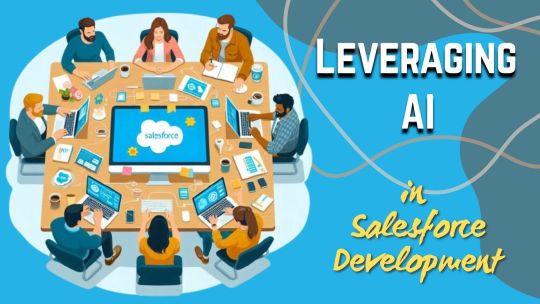
Leveraging AI in Salesforce Development
Artificial Intelligence (AI) is revolutionizing Salesforce development by infusing intelligence into traditional CRM processes. AI allows Salesforce to evolve from a static data management platform into a dynamic, insight-driven system that can predict, recommend, and automate key functions. With AI, Salesforce development is now more about building solutions that are not just reactive but proactive.
Know more at: https://www.cyberswift.com/blog/leveraging-ai-in-salesforce-development/
#generative ai in salesforce#salesforce ai cloud#salesforce einstein gpt#ai-powered crm solutions#bill cipher#salesforce automation with ai#predictive analytics in salesforce#ai-driven customer insights#ai-enhanced salesforce workflows#salesforce lightning and ai integration#chatbots and salesforce crm#salesforce consulting services#salesforce crm solutions#custom salesforce development#salesforce lightning development#salesforce app development#salesforce api integration#salesforce cloud services#salesforce automation solutions#salesforce migration services#salesforce support and maintenance#low-code salesforce development#ai-powered salesforce solutions#iot integration with salesforce#salesforce blockchain integration
1 note
·
View note
Text
Boost Your Success with Certified Field Service Lightning Consultant Exam Practice Questions

Becoming a Salesforce Certified Field Service Lightning Consultant can significantly advance your career, opening doors to new opportunities and enhancing your professional credibility. However, passing the certification exam requires thorough preparation and a deep understanding of the concepts. One of the most effective ways to ensure success is by using Certified Field Service Lightning Consultant Exam Practice Questions. This blog will delve into the importance of practice questions, how they can aid in your study process, and provide tips for maximizing their benefits.
0 notes
Text
Stay ahead of the curve in the rapidly evolving landscape of Salesforce development. Whether you're a developer looking to expand your skill set or a business professional aiming to maximize your Salesforce capabilities, this blog is your go-to resource for mastering Salesforce Lightning Web Components and building the next generation of user interfaces. Dive in and unlock the potential of LWC for unparalleled innovation in web development.
0 notes
Text
Master Inventory management with salesforce Field services!
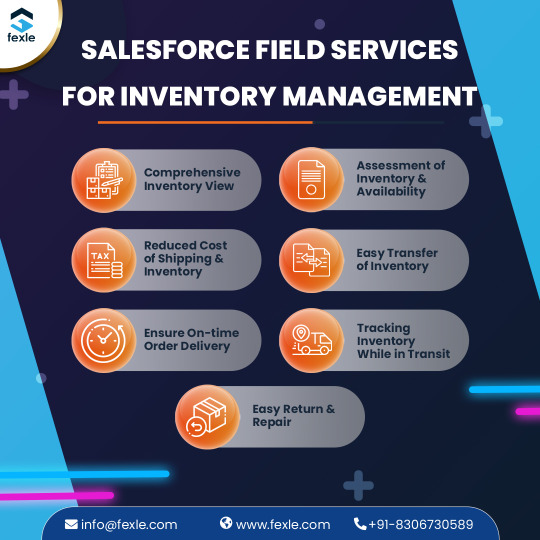
If effective inventory management is a priority for your business, including all your locations from warehouses and stockrooms to work vehicles and customer sites, we highly recommend enlisting the help of a Salesforce Consulting Partner.
With Salesforce Field Service Lightning (FSL), businesses with field service teams can benefit from a comprehensive solution for streamlining inventory management, order fulfillment, asset tracking, and more.
Discover the Key Features and Benefits of FSL Inventory Management, designed to enhance your inventory tracking experience and improve your mobile workforce productivity.
They are as follows :
With FSL, you can easily track inventory locations at every stage, ensuring that the right parts are available when needed.
2. Receive proactive notifications when stock levels are low, allowing for timely replenishment.
3. Effortlessly organize and track product details such as serial numbers and status in a centralized manner.
4. Monitor product transfers between different locations for improved visibility and control.
5. Capture crucial financial data, including asset costs, invoice numbers, cost centers, vendors, and general ledger accounts.
6. Simplify the process of returning and repairing sold items with FSL.
7. product disposal and depreciation management is a highly praised aspect of Salesforce Field Service. This robust feature offers a thorough solution for tracking costs, retirement dates, resale values, and other essential information for streamlined inventory management.
8. Take control of asset depreciation by accessing important details such as depreciation method, residual value, and salvage value.
9. Efficiently track the team members responsible for requesting and maintaining specific products.
10. Stay on top of related activities by documenting changes in asset status and recording comments for improved visibility.
How Can FEXLE Help You?
FEXLE, with its expertise in Salesforce implementation, offers tailored solutions to maximize the benefits of Salesforce Field Service Lightning.
Our team ensures seamless integration, customization, and training to empower your workforce and optimize your inventory management processes.
Partner with FEXLE to elevate your field service operations and harness the full potential of Salesforce Field Service Lightning.
#salesforce#Salesforce Field Services Lightning#salesforce consulting services#crm consulting#salesforce gold partner#fexle#salesforce implementation services
0 notes
Text
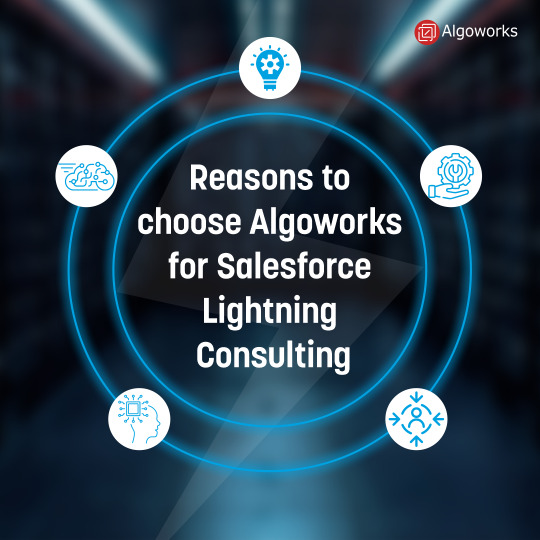
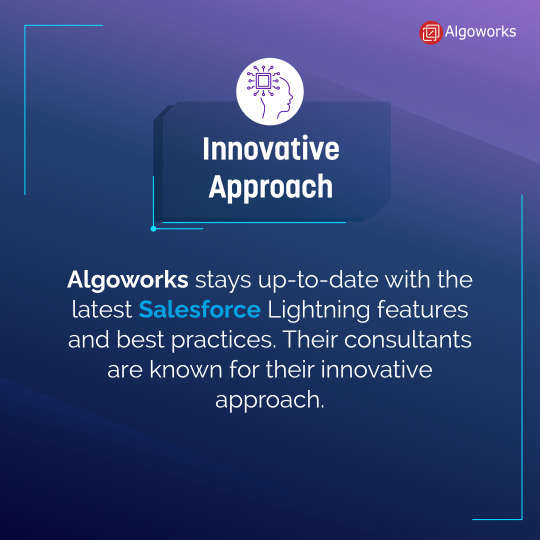
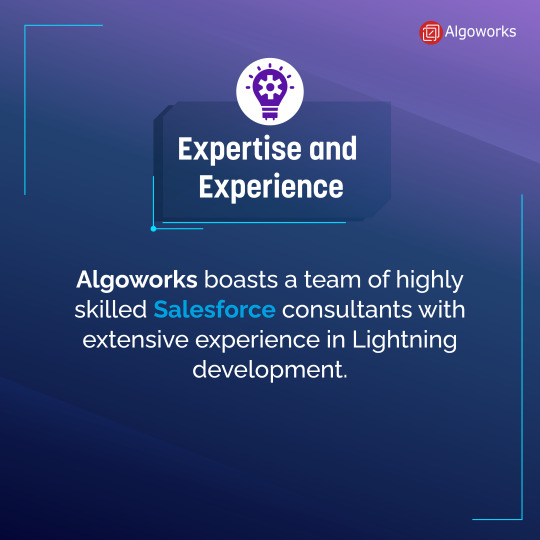

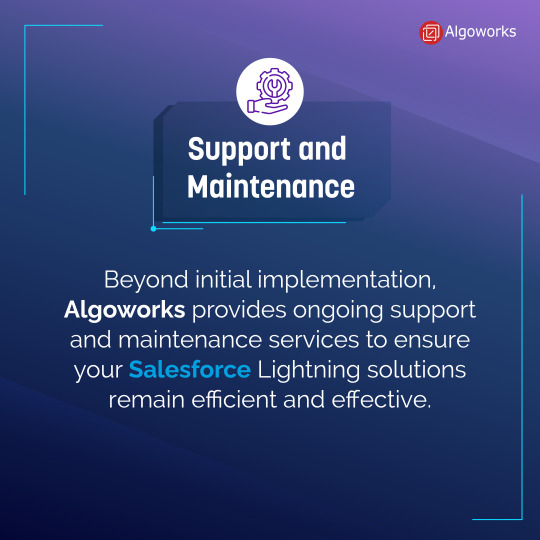

⚡ Elevate your Salesforce experience with Algoworks Lightning Consulting!
🚀 Discover the reasons why businesses are choosing us for seamless innovation and efficiency. 💡✨
#salesforce#salesforce lightning#consulting services#consultants#business#innovations#efficiency#innovation partner
1 note
·
View note
Text
1 note
·
View note
Text
What are some leading Salesforce consulting service providers in the USA?

1. Codleo consulting 2. Deloitte 3. Cognizant 4. Accenture 5. Slalom Consulting 6. West Monroe Partners 7. Capgemini 8. Keste LLC 9. Arcus Solutions Inc 10 Omneo Group
#salesforce consultants#salesforce consulting partners#salesforce development services#salesforce implementation services#salesforce consulting services#salesforce managed services#digital marketing services#salesforce support services#salesforce lightning migration#salesforce consulting partner
1 note
·
View note
Text

Maximize Efficiency with Expert Salesforce Lightning Services
Get our expert Salesforce Lightning services to increase the performance of your organization. Apply customized solutions to improve operations and get maximum productivity. Visit Wahinnoavtions now for expert Salesforce services - https://www.wahinnovations.com/salesforce-lightning-services/
#Salesforce lightning services#Salesforce Field Service#salesforce lightning solution experts#Salesforce lightning platform#Lightning Data Service
0 notes
Text
Top Salesforce Lightning Services for Seamless Migration
Unlock the potential of advanced Salesforce Lightning services for seamless migration from Salesforce Classic. Achieve improved user experiences, enhanced functionalities, and increased operational efficiency. With a focus on streamlined migration, expert guidance, and customized solutions, ensure a smooth transition to the Lightning interface. Damco Solutions is a trusted service provider delivering comprehensive Salesforce services for your business transformation needs.
0 notes
Text
Why Salesforce Developers are Unexplained Forces of Business (2023)

According to the company’s own website, Salesforce is known to be the world’s number one customer relationship management (CRM) platform. It is a software whose sole purpose is to help businesses grow by helping them understand the specific needs of their customers by using certain cloud-based apps that are designed for sales, marketing, and service.
However, since no 2 companies are the same, their Salesforce requirements will be different as well. When this takes place, it is usually good to have a top Salesforce development company handy, a company that is well-versed will customise the software development and in providing tailor-made solutions.
If this is something that piques your interest or if you are someone who is already working in Salesforce but would like to up your skills, then this blog is for you.
So What Is A Salesforce Developer?
A Salesforce developer is any person who builds Salesforce applications across different Platform as a Service (PaaS) platforms. However, it is important to keep in mind that he/she does not need to work for Salesforce in any way, shape, or form.
What Do They Do?
A developer dealing in Salesforce has a deep understanding of how it works along with sufficient experience with the platform. A Salesforce developer or a Salesforce development company is hired by an organisation to customise Salesforce to the unique needs of the hiring party. However, it should also be said that the developer can even be someone who is an in-house programmer who has the necessary skills to work with Salesforce. Some of the tools that are used by these developers include Visualforce and Apex and frameworks like Lightning Component.
Roles and Responsibilities of These Developers
One thing that can be easily noticed is that the roles and responsibilities of a Salesforce developer are pretty similar to those of any other professional developer working in a top software development company in India.
However, just for the sake of completeness, here are the roles and responsibilities of these developers:
· Analyse user needs, and then plan, design, test, and develop software that meets their unique needs.
· Come up with effective project plans and develop Salesforce solutions. Also add more value to the 3 stages of project work: definition, development, and deployment.
· Provide useful suggestions regarding software upgrades for existing apps and systems.
· Stay ahead of the transforming technological landscape of Salesforce, and .Net/Java platforms and also adapt quickly.
· Develop every part of any application and then plan how those different parts can mesh together.
· Create programs for use over the internet and for in-house users over the company intranet.
· Properly handle inconsistencies in data and come up with processes that can counter any deficiencies.
· Collaborate with other programmers by creating flowcharts so as to instruct them on how to write additional software code.
· Ensure that a program runs efficiently by performing routine maintenance and testing.
· Keep a record of the inventory of the company’s systems and applications for future reference, especially when it comes to upgrades.
· Team up with other computer specialists to develop optimum software.
Other than the above-mentioned points, one must also remember that a Salesforce developer should always maintain a cordial rapport with the client to understand their operation and Salesforce implementation needs. For example, the developer must make it a point to figure out how the customer is trying to use the software and also identify the core functionality. This means paying extra attention to user needs that go well beyond the scope of the software, issues concerning security, and system performance.
Therefore, you should understand by now that a Salesforce developer has a lot on his/her plate. Their work is extremely challenging, however extremely rewarding as we are going to see below.
What Is The Salary Of A Salesforce Developer?
The average salary of a Salesforce developer in India is somewhere around Rs.500,000 per annum including both profit-sharing and bonuses. It only goes without saying that the bigger the company the more money they will pay for your services. Digital technology solution companies usually pay around Rs.10, 00,000 per annum. Big names in the field like Deloitte and Cognizant pay well above Rs.6, 00,000 per year.
Salesforce developer salaries also vary according to the experience of the individual. An entry-level developer can expect his/her salary to be around Rs.3, 00,000 per annum. However, after gaining an experience of about 2-5 years the compensation can get close to Rs.5, 00,000 per annum. And if someone gains an experience of around 9 years the hefty paycheck can get close to Rs.10, 00,000 per annum.
It is also useful to remember that the salary of a Salesforce developer also varies according to the location of the individual and his/her job as well.
What Are The Benefits Of Hiring A Salesforce Development Team?
The benefits of hiring a dedicated Salesforce development team for your business are many. Let's look at some of these benefits as listed below:
1) Building a core business
One of the best ways of managing your in-house resources is by outsourcing your Salesforce development needs. Instead of having an in-house team, you can find experienced and thorough professionals in the field of Salesforce development taking care of your workload.
2) Skilled expertise
By having a quick look at the portfolio of the companies delivering dedicated Salesforce development services, you can get an idea of their expertise then and there. Therefore, by choosing a dedicated Salesforce team you can be certain of the fact that you have hired people with the right amount of expertise and skill set. They can not only understand your business processes but can also come up with the most apt cloud-based CRM solutions that are tailor-made for your business specifically.
3) 24/7 Availability
Needless a dedicated Salesforce development team will be ready to render their services round the clock. Nowadays, we live in a world where remote working has become the norm, and so have customisations and testing. Therefore, a team that will offer continuous support should always be sought out for. This way, even when the in-house team is sleeping, you will have a team of experts taking care of your CRM.
4) Cost-efficient
You can also save on costs by hiring a dedicated Salesforce development team in India. As a matter of fact, you can save up to 60% of your total costs. You can make use of this saved money to build your core business and pay more attention to business growth.
Nevertheless, here are a few wise words from Josh Kaufman on outsourcing, it goes like this - “For everything we don’t like to do, there’s someone out there who’s good at it, wants to do it, and will enjoy it.”
And that pretty much sums it all up. If you are really looking to get the best benefit from Salesforce, outsourcing is the best thing you can go for.
How to Become a Salesforce Developer?
After such an elaborate discussion on the roles and responsibilities of a Salesforce developer and the hefty compensation that comes with being one, you might ask “But how to actually become a Salesforce developer?” read on to find out about it!!
First, to begin with, most software developers including Salesforce developers have a bachelor’s degree in computer science, and software engineering along with excellent knowledge of computer programming. It is also useful to have knowledge and skills in the industry where these Salesforce skills can be put to the best of use. Moreover, you also need to have an understanding of Model-View-Controller design patterns, Object-Oriented Programming Principles, and Java, or .Net Programming.
Having an internship experience in a software business right after graduating from college also goes a long way. Arrangements like these can provide essential connections, skills, and much-needed experience. If you find it difficult to get a job as a developer, it is recommended to start as a programmer and then slowly work your way up to becoming a Salesforce developer.
In case, you want to become a Salesforce developer after a long time from graduating college, make sure to take an online course focussing on Salesforce development as it can teach you essential skills that are needed to get a job in a Salesforce development company. Certifications like these are crucial as they confirm to employers that you are armed with the skill set needed to do the job they want you to do.
What Are The Skills Required To Become A Successful Salesforce Developer?
In order to become a Salesforce developer there are certain specific skills that one needs to have and they are as follows:
· Analytical Skills: Having sufficient analytical skills assists in analysing the client’s needs and also in developing the requisite software.
· Communication Skills: These come in handy when dealing with customers as it might include explaining to them how an app works. It is also helpful in giving your juniors clear instructions on what needs to be done.
· Computer Skills: It goes without saying that excellent computer skills are a must-have for a Salesforce developer.
· Interpersonal Skills: a good Salesforce developer has to be someone who is doing teamwork at one point or another.
· Problem-solving Skills: This skill is probably the bread and butter of every developer. Being a developer you are in charge of overseeing every stage of the software development, and you can be assured of the fact that there are going to be problems at one stage or another.
In addition, it is also helpful for developers to be detail-oriented and be able to think out of the box. The former means developers need to be creative and in the latter case, a great developer must be able to deal with all the small details.
#SalesforceDeveloper#TechCareers#CRMDevelopment#BusinessSolutions#ITJobs#HiringSalesforce#CodingSkills#DigitalTransformation
2 notes
·
View notes
Text
0 notes
Text

🚀 Unlock the Power of Salesforce for Your Business! 🏆
Streamline your operations, enhance customer experiences, and drive growth with our expert Salesforce Development Services. From custom CRM solutions to seamless integrations, we help you maximize your Salesforce potential.
💡 Our Services Include:✅ Custom Salesforce Development ✅ CRM Implementation & Optimization ✅ App & API Integration ✅ Lightning Migration & Automation ✅ Support & Maintenance
Ready to transform your business? Let’s connect! 💬
#Salesforce #CRM #SalesforceDevelopment #BusinessGrowth #DigitalTransformation
0 notes
Text
How to Build Custom Apps on Salesforce Using Lightning Web Components (LWC)
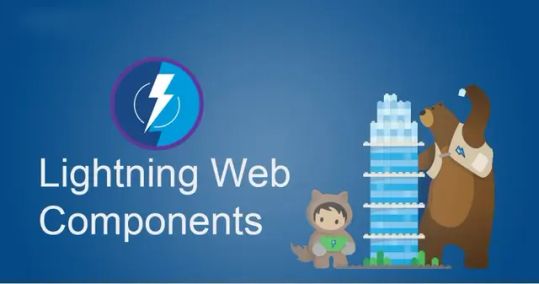
Salesforce is a leading platform in cloud-based customer relationship management (CRM), and one of its standout features is the ability to create custom apps tailored to an organization's specific needs. With the introduction of Lightning Web Components (LWC), Salesforce developers can now build faster, more efficient, and more powerful custom applications that integrate seamlessly with the Salesforce ecosystem.
In this blog, we’ll walk you through the process of building custom apps on Salesforce using Lightning Web Components.
What Are Lightning Web Components (LWC)?
Before diving into the development process, let’s briefly explain what Lightning Web Components are. LWC is a modern, standards-based JavaScript framework built on web components, enabling developers to build reusable and customizable components for Salesforce apps. It is faster and more efficient than its predecessor, Aura components, because it is built on native browser features and embraces modern web standards.
Why Use LWC for Custom Apps on Salesforce?
Performance: LWC is optimized for speed. It delivers a faster runtime and improved loading times compared to Aura components.
Reusability: Components can be reused across different apps, enhancing consistency and productivity.
Standardization: Since LWC is built on web standards, it makes use of popular technologies like JavaScript, HTML, and CSS, which makes it easier for developers to work with.
Ease of Integration: LWC components integrate effortlessly with Salesforce's powerful features such as Apex, Visualforce, and Lightning App Builder.
Steps to Build Custom Apps Using LWC
1. Set Up Your Salesforce Developer Environment
Before you begin building, you’ll need a Salesforce Developer Edition or a Salesforce org where you can develop and test your apps.
Create a Salesforce Developer Edition Account: You can sign up for a free Developer Edition from Salesforce’s website.
Install Salesforce CLI: The Salesforce CLI (Command Line Interface) helps you to interact with your Salesforce org and retrieve metadata, deploy changes, and execute tests.
Set Up VS Code with Salesforce Extensions: Visual Studio Code is the most commonly used editor for LWC development, and Salesforce provides extensions for VS Code that offer helpful features like code completion and syntax highlighting.
2. Create a New Lightning Web Component
Once your development environment is set up, you’re ready to create your first LWC component.
Open VS Code and create a new Salesforce project using the SFDX: Create Project command.
Create a Lightning Web Component by using the SFDX: Create Lightning Web Component command and entering the name of your component.
Your component’s files will be generated. This includes an HTML file (for markup), a JavaScript file (for logic), and a CSS file (for styling).
Here’s an example of a simple LWC component:
HTML (template):
html
CopyEdit
<template> <lightning-card title="Welcome to LWC!" icon-name="custom:custom63"> <div class="slds-p-around_medium"> <p>Hello, welcome to building custom apps using Lightning Web Components!</p> </div> </lightning-card> </template>
JavaScript (logic):
javascript
CopyEdit
import { LightningElement } from 'lwc'; export default class WelcomeMessage extends LightningElement {}
3. Customize Your LWC Components
Now that your basic LWC component is in place, you can start customizing it. Some common customizations include:
Adding Dynamic Data: You can use Salesforce data by querying records through Apex controllers or the Lightning Data Service.
Handling Events: LWC allows you to define custom events or handle standard events like button clicks, form submissions, etc.
Styling: You can use Salesforce’s Lightning Design System (SLDS) or custom CSS to style your components according to your branding.
Example of adding dynamic data (like displaying a user’s name):
javascript
CopyEdit
import { LightningElement, wire } from 'lwc'; import getUserName from '@salesforce/apex/UserController.getUserName'; export default class DisplayUserName extends LightningElement { userName; @wire(getUserName) wiredUserName({ error, data }) { if (data) { this.userName = data; } else if (error) { console.error(error); } } }
4. Deploy and Test Your Component
Once you’ve created your components, it’s time to deploy them to your Salesforce org and test them.
Deploy to Salesforce Org: You can deploy your component using the Salesforce CLI by running SFDX: Deploy Source to Org from VS Code.
Testing: You can add your LWC component to a Lightning page using the Lightning App Builder and test its functionality directly in the Salesforce UI.
5. Create a Custom App with Your Components
Once your custom components are developed and tested, you can integrate them into a full custom app.
Use the Lightning App Builder: The Lightning App Builder allows you to create custom apps by dragging and dropping your LWC components onto a page.
Set Permissions and Sharing: Ensure that the right users have access to the custom app by configuring user permissions, profiles, and sharing settings.
6. Iterate and Improve
Once your app is live, collect user feedback and iteratively improve the app. Salesforce offers various tools like debugging, performance monitoring, and error tracking to help you maintain and enhance your app.
Best Practices for Building Custom Apps with LWC
Component Modularity: Break down your app into smaller, reusable components to improve maintainability.
Optimize for Performance: Avoid heavy processing on the client-side and use server-side Apex logic where appropriate.
Use Lightning Data Service: It simplifies data management by handling CRUD operations without the need for Apex code.
Follow Salesforce’s Security Guidelines: Ensure that your app follows Salesforce’s security best practices, like field-level security and sharing rules.
Conclusion
Building custom apps on Salesforce using Lightning Web Components is an effective way to harness the full power of the Salesforce platform. With LWC, developers can create high-performance, dynamic, and responsive apps that integrate seamlessly with Salesforce’s cloud services. By following best practices and leveraging Salesforce’s tools, you can build applications that drive business efficiency and enhance user experience.
If you're interested in building custom Salesforce applications, now is the perfect time to dive into Lightning Web Components and start bringing your ideas to life!
0 notes